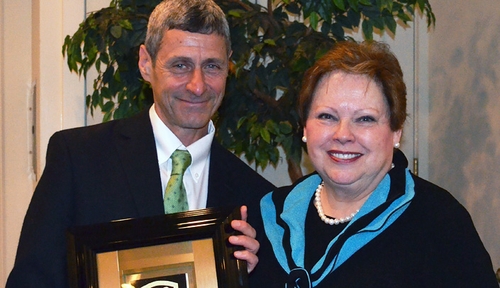The ALS Association, along with its Keith Worthington Chapter, welcomed the University of Nebraska Medical Center and its clinical partners – UNMC Physicians and The Nebraska Medical Center — to the nonprofit organization’s Certified Treatment Center of Excellence Program, establishing the med center as meeting the highest levels of established national standards of care in the management of amyotrophic lateral sclerosis (ALS), often referred to as Lou Gehrig’s disease.
National President and CEO Jane Gilbert made the announcement at a May 20 event in Omaha that also honored Tom Tonniges, M.D., a pediatrician and UNMC alumnus who was diagnosed with ALS in 2012. A fund created by the Tonniges family — the Dr. Thomas F. Tonniges Fund for Advancement of ALS Clinical Care and Research — will support clinical care, research and special projects at the Med Center's ALS Clinic.
Gilbert presented a certification plaque recognizing the med center as a Certified Treatment Center of Excellence to Matthew Rizzo, M.D., the Reynolds Professor and chairman of the UNMC Department of Neurological Sciences.
“The care that people receive here is a model for other parts of the country, and I’m proud that we are able to recognize the Med Center for its outstanding multidisciplinary approach to treating people with this devastating disease,” said Colleen Wachter, executive director, Keith Worthington Chapter.
J. Americo Fernandes, M.D., associate professor of neurological sciences, directs the med center’s ALS program, which includes physicians, physical therapists, occupational therapists, nurses and clinic staff who are employed by UNMC Physicians and The Nebraska Medical Center.
ALS is a progressive neurodegenerative disease that affects nerve cells in the brain and the spinal cord. Eventually, people with ALS lose the ability to initiate and control muscle movement, which often leads to total paralysis and death within two to five years of diagnosis. There is currently no cure for the disease.
The ALS Association’s Certified Center Program staff designs, implements and monitors programs based upon national standards of best-practice care in the management of the disease.
The ALS Association offers the Certified Treatment Center of Excellence designation for those institutions that meet the rigorous eligibility criteria, which includes:
- diversity of professional expertise in ALS;
- access to coordinated, multidisciplinary care;
- a strong, ongoing relationship with the local ALS Association chapter; and
- evidence of active participation in ALS research.
This designation assures people living with ALS and families that these centers offer the highest level of evidence-based, quality care and services.
Research has shown that multidisciplinary care, or the practice of having physicians and other health care professionals collaborate to provide the most comprehensive treatment plan for patients, helps people with ALS have better quality of life and actually prolongs life in most cases. The Keith Worthington Chapter has a long history supporting multidisciplinary care, including financial support and staffing.
“We are delighted to have met the criteria for becoming a Certified Treatment Center of Excellence,” said UNMC Chancellor Jeffrey P. Gold, M.D. “and are thankful for the continued support from the Keith Worthington Chapter in helping provide the very best care for patients in Nebraska.”
The ALS Association Keith Worthington Chapter serves hundreds of people living with ALS and their families in Kansas, Nebraska and western Missouri with offices in Kansas City, Omaha, Wichita and Springfield, Mo. The chapter provides a wide array of services, including two certified treatment centers of excellence and an affiliated treatment center as well as support groups, an equipment program and an extensive resource library and referral system.
About The ALS Association Keith Worthington Chapter
The ALS Association is the only national non-profit organization fighting Lou Gehrig’s disease on every front. By leading the way in global research, providing assistance for people living with ALS through a nationwide network of chapters, coordinating multidisciplinary care through certified and recognized treatment centers, and fostering government partnerships, the association builds hope and enhances quality of life while aggressively searching for new treatments and a cure. For more information about the ALS Association, visit www.alsa-midwest.org.
